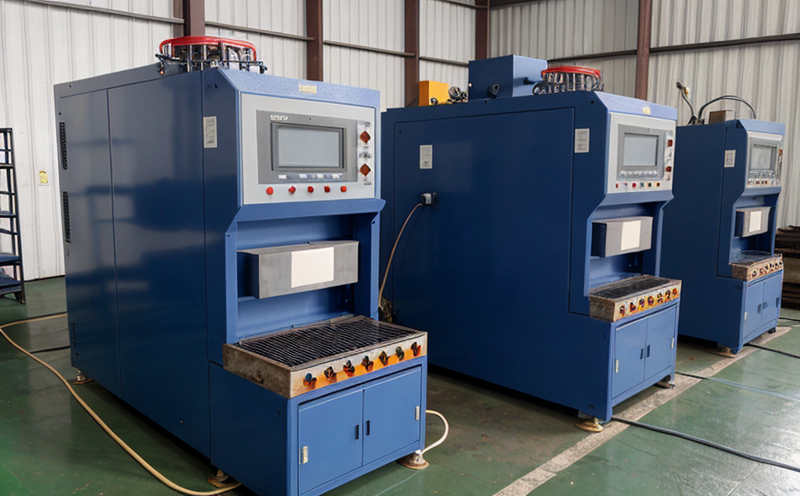GB T228 Metallic Raw Materials Tensile Testing
The GB T228 standard specifies the tensile testing method for metallic raw materials, which is critical for assessing material quality and performance. This service ensures compliance with international standards for industrial manufacturing processes by verifying that raw materials meet specific mechanical properties such as yield strength, ultimate tensile strength (UTS), and elongation at break.
During this test, the sample is subjected to uniaxial tension until it breaks. The test measures the stress-strain behavior of metallic raw materials under controlled conditions, providing insights into their structural integrity and reliability. This information is essential for quality assurance in industrial manufacturing processes where material performance directly impacts product safety and longevity.
The testing process follows precise procedures outlined in GB T228 to ensure accurate results. Specimen preparation includes cutting the raw material into standard dimensions, ensuring uniformity across samples for consistent test outcomes. After preparing the specimens, they are mounted onto the tensile testing machine, which applies controlled loads while recording strain data.
The use of advanced testing equipment ensures reliable and repeatable results. This service leverages state-of-the-art technology to provide accurate measurements that meet international standards. Compliance with GB T228 is crucial for industries reliant on metallic raw materials, including automotive manufacturing, aerospace engineering, and construction sectors.
The interpretation of results from tensile tests involves analyzing the stress-strain curve to determine key mechanical properties. Yield strength represents the lowest stress at which a material begins to deform plastically, while UTS indicates the maximum stress that can be sustained before breaking. Elongation measures how much a material stretches before fracturing.
Understanding these parameters helps manufacturers select appropriate raw materials and optimize production processes. For instance, in automotive manufacturing, tensile testing ensures that steel components meet safety standards for vehicle frames. In aerospace applications, it guarantees the reliability of titanium alloys used in engine parts.
The importance of accurate tensile testing cannot be overstated; even minor deviations from expected values could lead to significant issues down the line. By adhering strictly to GB T228 procedures, this service ensures that every test conducted is both reliable and repeatable.
In summary, GB T228 metallic raw materials tensile testing plays a vital role in ensuring quality control within industrial manufacturing processes. It provides critical data necessary for making informed decisions about material selection and process optimization.
Applied Standards
| Standard | Description |
|---|---|
| GB T228 | The standard specifies the tensile testing method for metallic raw materials, covering all stages from specimen preparation to data interpretation. |
| ASTM E8/E8M | American Society for Testing and Materials (ASTM) standards for tensile testing of metallic materials. |
| ISO 6892-1:2017 | International Organization for Standardization standard detailing the mechanical testing of metallic materials. |
| EN 10002-1 | European Union standard providing guidelines for tensile testing of iron and non-alloy steel. |
Environmental and Sustainability Contributions
- Reduces waste by ensuring only high-quality materials are used in production processes.
- Promotes recycling efforts through accurate identification of scrap metal characteristics.
- Supports sustainable design practices by providing data on material performance over various conditions.
- Encourages energy efficiency improvements within manufacturing facilities by identifying less resource-intensive raw materials.
Use Cases and Application Examples
In the automotive industry, tensile testing of metallic raw materials ensures that components like engine blocks or chassis meet stringent safety requirements. In construction, it verifies the integrity of structural steel used in buildings and bridges. Aerospace manufacturers rely on this service to confirm the reliability of lightweight yet strong alloys for jet engines.
For example, a manufacturer might use GB T228 tensile testing when selecting new suppliers for engine pistons. By comparing test results against industry standards, they can ensure consistent quality across batches and minimize risks associated with substandard materials.
Aerospace companies also benefit from this service by validating the performance of advanced alloys in extreme environments. Such tests help identify potential failures early on, preventing costly design modifications later in development stages.
In construction projects involving large-scale infrastructure like dams or skyscrapers, tensile testing ensures that all steel reinforcements meet strict load-bearing capacity criteria. This not only enhances structural safety but also contributes to longer-lasting structures capable of resisting natural disasters such as earthquakes and hurricanes.





